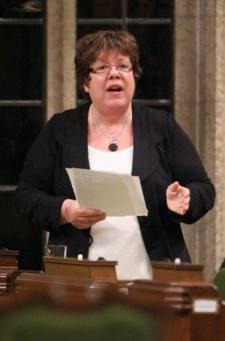As the NDP House leader, lesbian MP Libby Davies is in charge of her party’s day-to-day business in the Commons.
The trouble is, it’s difficult to do that job when you’re effectively shut out of work for two months.
On Dec 30, Prime Minister Stephen Harper phoned the Governor General to request prorogation — ending the current session of Parliament — with an eye to a new throne speech on Mar 3 and a budget speech the following day.
Prorogation normally happens at the end of a government’s legislative agenda, when they’re ready to take stock and come up with a new agenda — hence a new throne speech. But this is the third time that Harper has called for a prorogation in the middle of a legislative agenda.
“Under prorogation, everything on the Order Paper, everything that’s in the House is gone,” says Davies.
“Private members’ business still survives — that’s traditionally been the case,” Davies adds. “But all government bills, whatever’s in committee, whatever’s being debated, what’s in the Senate, what’s still in process — it’s gone.”
The biggest irony, according to Davies, is that the government has been accusing the opposition parties of holding up its tough-on-crime legislation, and yet this is the third prorogation that Harper has called.
“Some of these bills that he claims are so critical and important to their political agenda — he’s actually eliminating his own legislative agenda,” Davies says.
One of the other unusual features of this prorogation is the length of time that it spans.
“We have to ask the question: What has [Harper] got to hide?” Davies says. “The fact that he took this unilateral action in December, a full month before the House was due to come back, clearly shuts down any committees meeting. Clearly they’re trying to avoid any scrutiny and accountability on the whole question of Canada’s involvement in the war in Afghanistan, and possibly other issues, but I would say that’s a key one.”
When the House is simply in recess, committees can still meet, as the Afghanistan committee has been. With Parliament prorogued, those committees cease to exist and can no longer meet. It also means that committee work, such as the study on Section 13 (hate speech provisions) of the Canadian Human Rights Act, dissolves until the committees can be reformed and decide whether or not to resurrect it.
Davies wonders what the government didn’t want to come out before or during the Olympics, when the world’s media will be in Vancouver.
“The official reason from the PMO was they wanted to take time to think about how they’re going to deal with the economic recovery,” Davies says. “Well for god’s sake, they’ve had a year to start thinking about this, and all the more reason why Parliament should be in session, to engage in that process. The whole thing is so suspicious and so rooted in his own political agenda of trying to avoid public accountability on the Afghanistan issue and not wanting to face the music, so to speak.”
As for the loss of the legislative agenda, there are ways that a government can return all bills to the Order Paper in the same place they were before they were dissolved, but that requires consent of all parties, and the NDP isn’t willing to give it — especially when they’re happy to see certain pieces of legislation die, such as the Canada-Colombia Free Trade Agreement and several crime bills.
“He made this decision, he needs to live with the consequences,” Davies says.
Private members’ business remains unaffected, as does the order of precedence by which it was called. Davies’ own private members’ bill on a national housing strategy will therefore remain at third reading, while Bill Siksay’s bill on trans rights should still be up for debate soon after Parliament resumes.
As for what happens next, Davies says that her party will discuss the matter at their caucus retreat at the end of the month.
“We’ve got to be more creative, we’ve got to think about how do we bring forward the public agenda… because clearly we’re not going to let Stephen Harper off the hook, and we will continue to be as effective an opposition as we can be, even though he’s denied us the opportunity to go and work in Ottawa.”
Dale Smith is Xtra’s federal politics reporter. He blogs every weekday on Xtra.ca — check out Hill Queeries.


 Why you can trust Xtra
Why you can trust Xtra


